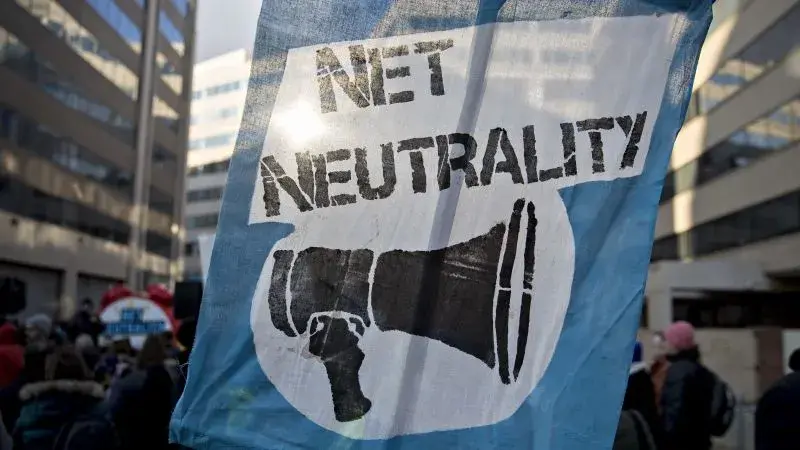With Thursday’s party-line vote, the FCC redefined internet service as similar to legacy telephone lines, a sweeping move that comes with greater regulatory power over the broadband industry.
Leading FCC officials have said restoring net neutrality rules, and reclassifying ISPs under Title II of the agency’s congressional charter, would provide the FCC with clearer authority to adopt future rules governing everything from public safety to national security.
“Broadband is a telecommunications service and should be regulated as such,” said Justin Brookman, director for technology policy at Consumer Reports. “The Title II authority will ensure that broadband providers are properly overseen by the FCC like all telecommunications services should be.
“These 400-plus pages of relentless regulation are proof positive that old orthodoxies die hard,” said Jonathan Spalter, CEO of USTelecom, a trade association representing internet providers.
My god the fucking irony. The trade association made up of Broadband ISPs, arguing that they shouldn’t be regulated as Telecom providers, is literally called… USTelecom.
“Don’t treat us like ducks!” said the trade association representative from USDucks.
I think net neutrality is a good thing, but could this reclassification mean that the FCC will have increased authority to police content online? There has been a lot of worrying activity around that lately in general, and the FCC has a history of imposing censorship on traditional media.
Net Neutrality is about not policing content online. That’s kind of its whole thing:
These net neutrality policies ensured you can go where you want and do what you want online without your broadband provider making choices for you. They made clear your broadband provider should not have the right to block websites, slow services, or censor online content. These policies were court tested and approved. They were wildly popular. In fact, studies show that 80 percent of the public support the FCC’s net neutrality policies and opposed their repeal.
The closest we get to online censorship is obscenity laws, which one might think applies to porn, but obscenity is actually defined much more narrowly than just “content designed to arouse”. Obscenity is basically stuff that even Hugh Hefner would find offensive, stuff the average adult would find deeply repulsive and abhorrent (not just a little bit, the exact language is “patently offensive”). Adult content in general (obscenity & indecency) is banned from broadcast media during daytime hours to keep kids from seeing it; subscription-based services are exempt from such rules, which presumably means that the adults who pay for the subscription are supposed to be the ones preventing kids from using it to view adult material, if such is possible. I expect this is why anything which does manage to qualify as obscene is typically very hard to get to unless you really want to see it, so nobody who might report it ever actually finds it.
It’s worth mentioning that obscenity laws apply whether Net Neutrality is a thing or not, so having it will be a net reduction in the avenues through which content may be censored or policed. Now if only they’d ban ISPs from selling your data to brokers…
It’s worth mentioning that obscenity laws apply whether Net Neutrality is a thing or not
Couldn’t this reclassification affect that sort of thing in a jurisdiction sense though? Again, I like net neutrality, mostly because the idea of something like the standard internet option being Facebook only is terrifying, but it sounds like a big part of this is reclassifying ISPs to be subject to rules made by the FCC. I’d really rather it be a law passed by congress, and I worry about how federal agencies might abuse their powers over the internet when those powers are expanded in general. I’m not really sure how much it generally expands their authority over the internet, but it seems like it might.
“Title II” in this context refers to Subchapter II of 47 U.S.C. Chapter 5. 47 U.S.C. is the Communications Act of 1934, the act of Congress that established the FCC, and Chapter 5 is the part that deals with “Wire and Radio Communications.”
If you want to know what this law empowers the FCC to do, you can read the statute yourself. Or, if that’s too difficult, you can also use your access to the internet to look up more accessible sources, such as Wikipedia’s “Common carrier” article.
Thanks for pointing that out! That’s … truly special 😂
This alone is enough to answer why people need to vote for Biden next term!!!
Finally, I remember the Ajit Pai era all too well when the FCC was auditioning for lucrative future revolving door private gigs. Rather than looking out for consumers.
Ajit Pai didn’t have to audition for anything. His employment was already guaranteed. He just had to do his assigned task. You see the same with NASA’s Kathy Lueders and SpaceX. The US is totally blind when it comes to the concept of conflict of interests.
PS: When I typed ‘Ajit Pai’, my phone auto corrected it to ‘Ajit Paid’. I guess even my phone knows!
And the moment a Republican administration is back, it’ll be gone again. This needs to be codified in law, not flip flopping every few years.
That would require Congress to act and Congress is barely capable of accomplishing the bare minimum to keep the budget running so the entire world isn’t thrown into chaos. Asking them to do anything that actually protects consumer rights is going to take either an emergency or an extreme electoral shift.
I don’t disagree. And while I agree with the FCC continually trying to keep Net Neutrality alive, it’s a stopgap measure at best, one that will come and go until there is an elected Congress that isn’t full of greedy, sycophantic, whiny, spineless pieces of shit.
Get gov hands off the internet.
relevant username
It chose me ? 🤷♂️
That is the worst misrepresentation of Net Neutrality I’ve ever seen. This “article” makes it sound like the government is protecting you. It makes me want to vomit. They get away with this because nobody reads the actual bills. They just take what the media writes and accepts it as truth.
I get the feeling you cheerlead for big business and corporations over working people and unions.
Troll alert.
Can you elaborate? 'cause I sure as hell ain’t gonna look it up
Arstechnica has a good article explaining.
Now, for the user above, I’m not entirely sure what they’re talking about since this isn’t a bill that has been passed, but net neutrality is to protect consumers - it’s to ensure large companies cannot stack the deck to make you use their preferred (owned) services.
Thank you and sorry at the same time for not phrasing my question properly; I know what it is, I am just very baffled on how it should be a bad thing if they strengthen the enforcement net neutrality. Imo, this is always a pure win for the consumer as it prevents a lot of malicious business models. So basically: no idea what the initial commenter is complaining about.
no idea what the initial commenter is complaining about.
Indeed, and now thanks to the other comment I can reference that they’re just mad that bitch is eating crackers.
The user above is just one of those guys who looks at anything the dems do and thinks, look at this bitch eating crackers.
Nothing good can ever be celebrated or praised. It has to always be bad.
I’ve always wondered, what do Comcast’s boots taste like?
This comment is the worst misrepresentation of penguins I’ve ever seen. It sounds like a red herring. It makes me want to vomit. People get away with this because nobody actually knows what penguins are. They just take what the media writes and accepts it as truth.
On a serious note, plenty of people here surely know what net neutrality is. Net neutrality is the guarantee that your ISP doesn’t (de-)prioritize traffic or outright block traffic, all packets are treated equally. In other words it means you don’t have to pay $5 extra for high speed access to Lemmy because Reddit and your ISP (say Comcast) would prefer Lemmy not exist.
On a serious note, plenty of people here surely know what net neutrality is. Net neutrality is the guarantee that your ISP doesn’t (de-)prioritize traffic or outright block traffic, all packets are treated equally.
That’s true but it’s also the common (but overly shallow) take. It’s applicable here and good enough for the thread, but it’s worth noting that netneutrality is conceptually deeper than throttling and pricing games and beyond ISP shenanigans. The meaning was coined by Tim Wu, who spoke about access equality.
People fixate on performance which I find annoying in face of Cloudflare, who is not an ISP but who has done by far the most substantial damage to netneutrality worldwide by controlling who gets access to ~50%+ of world’s websites. The general public will never come to grasp Cloudflare’s oppression or the scale of it, much less relate it to netneutrality, for various reasons:
- Cloudflare is invisible to those allowed inside the walled garden, so its existence is mostly unknown
- The masses can only understand simple concepts about their speed being throttled. Understanding the nuts and bolts of discrimination based on IP address reputation is lost on most.
- The US gov is obviously pleased that half the world’s padlocked web traffic is trivially within their unwarranted surveillance view via just one corporation in California. They don’t want people to realize the harm CF does to netneutrality and pressure lawmakers to draft netneutrality policy in a way that’s not narrowly ISP-focused.
Which means netneutrality policy is doomed to ignore Cloudflare and focus on ISPs.
Most people at least have some control over which ISP they select. Competition is paltry, but we all have zero control over whether a website they want to use is in Cloudflare’s exclusive walled garden.
A website isn’t a common carrier, you cannot argue that a website isn’t allowed to control who they serve their content to. An ISP is a common carrier because they simply act as a dumb pipe between the provider (websites) and the consumer.
Cloudflare is a tool websites use to exercise that right, necessitated by the ever rising prevalence of bots and DDoS attacks. Your proposed definition of net neutrality would destroy anyone’s ability to deal with these threats.
Can you at least provide examples of legitimate users who are hindered by the use of Cloudflare?
A website isn’t a common carrier
We were talking about network neutrality, not just common carriers (which are only part of the netneutrality problem).
you cannot argue that a website isn’t allowed to control who they serve their content to.
Permission wasn’t the argument. When a website violates netneutrality principles, it’s not a problem of acting outside of authority. They are of course permitted to push access inequality assuming we are talking about the private sector where the contract permits it.
Cloudflare is a tool websites use to exercise that right,
One man’s freedom is another man’s oppression.
necessitated by the ever rising prevalence of bots and DDoS attacks.
It is /not/ necessary to use a tool as crude and reckless as Cloudflare to defend from attacks with disregard to collateral damage. There are many tools in the toolbox for that and CF is a poor choice favored by lazy admins.
Your proposed definition of net neutrality would destroy anyone’s ability to deal with these threats.
Only if you neglect to see admins who have found better ways to counter threats that do not make the security problem someone elses.
Can you at least provide examples of legitimate users who are hindered by the use of Cloudflare?
That was enumerated in a list in the linked article you replied to.












